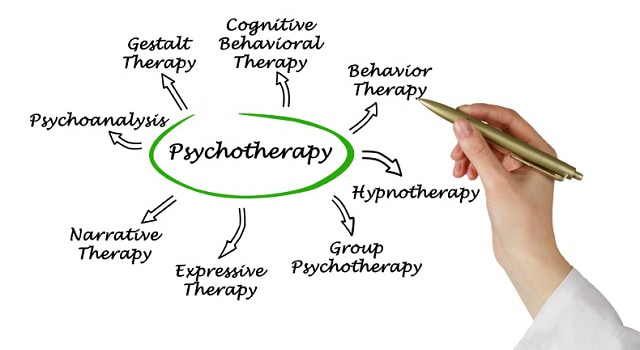There are many important components that make up an effective and comprehensive drug treatment program. Arguably the most important foundation piece in any program is therapy. Whether it is done on a one-on-one basis or done in a group setting, therapy gives those new in recovery the support and encouragement they need to address the underlying issues of their substance abuse. Therapy also gives people the tools they need to become empowered in making changes to their life that support their new found sobriety.
Experienced addiction professionals have a wide variety of therapy options they can employ to help clients effectively address their addiction, and one of the most popular therapy options is cognitive-behavioral therapy (CBT). The following article will explore the history of CBT, how it works and its benefits in addiction treatment. In your search for the best drug rehab that fits your needs, quality therapy programs such as cognitive-behavioral therapy should be at the top of your list.
If you have further questions regarding the effectiveness of CBT in your treatment program, contact the addiction professionals at Guardian Recovery Network today.
What is Cognitive Behavioral Therapy?

Cognitive behavioral therapy is a form of psychotherapy in which newly recovering addicts work with an experienced therapist in exploring the relationships that exist in a person’s thoughts, feelings and behaviors. During CBT sessions, the therapist will actively work with a person to uncover any and all unhealthy patterns of thought and how they may be causing self-destructive behaviors and beliefs. When these patterns are addressed, the person and therapist can collaborate to develop constructive ways of thinking that will produce healthier behaviors and beliefs.
As a therapy, CBT was developed in the late 1960’s by psychiatrist Aaron Beck. During this time period, Beck was performing psychoanalysis on his patients and he observed that during his analytical sessions, his patients tended to have an internal dialogue going on in their minds but they would only report a fraction of this kind of thinking to him. Eventually, Beck had come to a realization there was a concrete link between a person’s thoughts and their feelings.
Beck came up with the term automatic thoughts to describe those thoughts that might pop up in the mind. He had discovered that people weren’t always fully aware of such thoughts, but they could learn to identify and report these thoughts. If a person was feeling upset in some way, the thoughts were usually negative and neither realistic nor helpful. Ultimately, Beck had found that identifying these thoughts was the key to the client understanding and they could eventually learn to overcome their difficulties.
How Does A CBT Session Work?
While CBT is considered a form of psychotherapy, it differs from other forms of psychotherapy in the fact that CBT sessions have an inherent structure whereas other psychotherapy forms allow people to speak freely about whatever comes to mind. At the beginning of CBT therapy, the client will meet with the therapist to describe specific problems and to set specific goals they want to achieve. These problems are related to their substance abuse and are uncovered during the first sessions.
When these underlying problems are discovered and a client’s goals are established, they become the basis for planning how future CBT sessions will unfold in regards to tackling those problems. At the beginning of each session, both the client and therapist will jointly decide on the main topics they want to work on. The client and therapist will also have time at the beginning of each session to discuss what happened the previous session. Together, they will look at the progress made with the “homework” the client had worked on. At the end of each session, the client and therapist will plan another assignment to be completed.
Homework is a vital part of CBT. These assignments can include keeping a diary where clients can write down those times during the day where they felt anxiety or depression. Homework can also include specific exercises to work on that were given by the therapist. While cognitive-behavioral therapy for addiction is designed to be used on a one-on-one basis, it can be easily modified for use in groups.
When done in a group setting, CBT can benefit each individual within the group due to the fact they can share their difficulties with others who are experiencing the same issues. Having peer support and encouragement can help break through obstacles at a much quicker pace.
Benefits of CBT

Cognitive-behavioral therapy can provide great benefits to those who are in an addiction recovery setting. First and foremost, the structure of CBT allows clients to identify problems, set definite and achievable goals, and they are able to incorporate homework and other exercises into their therapy experience in order to gauge their progress. CBT also helps remind clients they have the power and capability to address and overcome the issues that have impacted their life to a negative degree.
An additional benefit for clients who utilize CBT is that it is a short-term therapy. In some cases, clients can notice a substantial improvement in only a few sessions while others may need treatment for several months depending on the severity of their problems, among other things. Typically, an individual session lasts about an hour, and sessions usually take place once a week–although the frequency of weekly meetings can change depending on the severity of one’s problems.
Turn to Guardian Recovery Network for Drug Treatment Programs That Truly Work
When you make the commitment to enter a drug treatment facility, you have to be absolutely certain that therapy and other essential treatment services are truly effective and proven to work. At Guardian Recovery Network, our experienced addiction professionals are able to create individual treatment plans that are evidence-based and backed by research. No matter how long your stay, the addiction professionals at Guardian Recovery Network will be with you every step of the way providing the best in compassionate care.
Call Guardian Recovery Network toll-free right now.




















